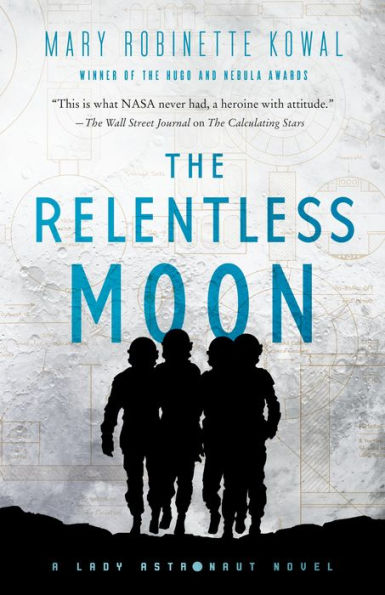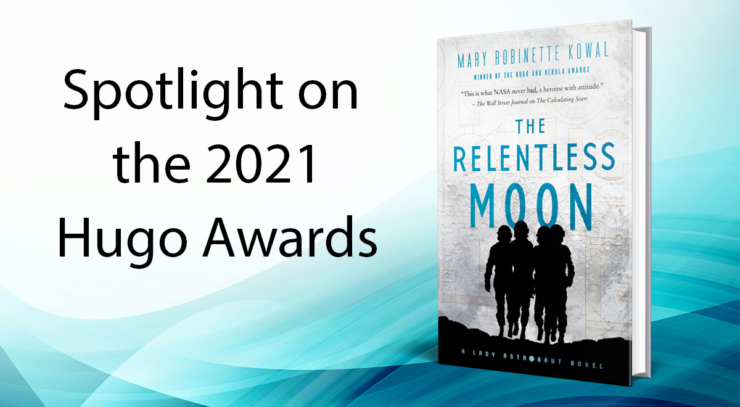In the lead-up to the 2021 Hugo Awards, we’re taking time to appreciate this year’s best novel Finalists, and what makes each of them great.
The Relentless Moon marks roughly the halfway point of Mary Robinette Kowal’s Lady Astronaut series, at least considering how many books have been published and/or announced so far. It’s fitting, then, that the 2020 novel represents a shift in how her punch-card-punk alternate-universe series addresses its own premise: The first two novels, The Calculating Stars and The Fated Sky, are about humanity’s rush to figure out a way off-planet before The Meteor’s climate cataclysm renders the Earth completely uninhabitable. The Relentless Moon doesn’t have all the answers yet—but by transforming into a tense spy thriller set in a claustrophobic lunar colony, it picks that equation back up and continues to work toward a solution with a fresh set of eyes.
Note: This post contains spoilers.
There’s a lot about The Relentless Moon that was jarring (in that most unintentionally prescient way of genre authors who are paying close attention to the speculative before it becomes real-life) to read at the start of the Covid-19 pandemic, and which have only increased in resonance upon revisiting in 2021. Particularly the Earth First movement, of people pushing back against the International Aerospace Coalition’s (IAC) idea of leaving our planet for a new home among the stars despite it being the best and clearest option. Yet it’s not the easiest way out, which would be to stay put and stubbornly ignore the warning signs of Earth’s increasingly inhospitable climate and just run the clock out on the human race.
Buy the Book


The Relentless Moon
The future of humanity has to make it work, in order to find a way forward—and part of that requires transporting plenty of Earth’s idiosyncracies and graver systemic issues to space before they can be properly addressed. No one knows that better than senator’s wife, astronette, and Swiss finishing school-trained spy Nicole Wargin. The charming, genial, middle-aged Nicole both occupies the privileged position of the supposed “elites” escaping into the stars yet still struggles against the same prejudices that threatened to ground her on terra firma.
The Earth Firsters would be vindicated to know that just because you break atmosphere doesn’t mean that your problems fall away like the pieces of a rocket launcher. Despite Nicole getting the go-ahead to journey to the lunar colony, both her age and her gender make her no one’s first choice for piloting the launch or otherwise taking up a position of power within the colony. Instead, she must continue to rely on the soft powers, which have made her so invaluable to husband Kenneth’s presidential bid back on Earth, to grease the wheels at the colony. Similarly, zero-G doesn’t change the fact that Nicole struggles with anorexia; while Kenneth was able to help her manage it at home, the microaggressions and other mounting stresses have her reverting to the familiarity of her disordered eating as a coping mechanism.
However, the claustrophobic and highly cooperative nature of the colony means that problems have to be addressed—especially once it becomes clear that someone affiliated with Earth First is sabotaging this community. What begins as seemingly inconvenient tampering escalates to a full-on polio epidemic—another plot detail that hits differently in a post-covid world—that will torpedo the IAC’s lunar experiment, if they let the old bullshit lie. If the other astronauts and scientists disregard Nicole as a middle-aged has-been, or if they refuse to follow the emergency leadership of Black astronaut Eugene Lindholm, then people will die, and one of humanity’s potential future homes will be snuffed out.
And this is where Nicole upends the status quo by outing herself as a spy.
When reviewing the novel last year, I kept mum on delving too much into the already multifaceted Nicole’s other-other training, not wanting to reveal a plot detail that factors into the latter half of the book. As we’re revisiting it for the Hugos, however, we can celebrate how Nicole allowing Eugene and Myrtle to witness this final piece of their friend and colleague’s persona click into place makes her both vulnerable and fearsome. For the first half of the novel, it seems as if Nicole’s life is an open book; then she reveals that the reader, as well as the people she’s supposedly closest to, only know as much as she wants them to know. By offering up this part of her past, she allows herself to be vulnerable in the present, which in turn allows her to accept help when her eating disorder threatens her capacity to keep herself and others safe.
Spy Nicole is completely in her element, combining the qualities she had already displayed at disparate points in the novel—charming politicians at parties, negotiating her way into the mission, commiserating with fellow Lady Astronaut Elma York on Mars—into a honed point to locate the saboteur(s) in her midst. This is when Relentless Moon goes full pulse-pounding spy thriller, sifting through each astronaut’s baggage from Earth to separate their own bullshit from genuine motives. It’s a trip to see the book, like Nicole, come into its own.
While it’s Elma who technically paves the way (though, as she points out, you can’t pave stars) for astronettes like Nicole and Myrtle, The Relentless Moon’s shift in genre is what opens up possibilities for what Elma’s next story could be. The Martian Contingency will chronicle Elma and her husband Nathaniel’s struggles to settle the Mars colony; from what Kowal has described, it will have a frontier-town vibe, with a handy ticking clock in the form of an eight-day window to abort the mission and return to Earth…
Let’s not forget that this series began with the “Lady Astronaut of Mars” novelette, following sixty-three-year old Elma as she considers one last jaunt among the stars, launching not from Earth but from her home on Mars. Every book in the series, then, is a prequel to this far-future character study of the original Lady Astronaut, which confirms that humanity does resettle on at least one other planet. But knowing the ending doesn’t preclude the importance of learning how exactly we get there, and who gets us there—sacrifices, joys, and all.
Natalie Zutter is a playwright and pop culture critic based in Brooklyn. She talks about SFF books, movies, and TV on Twitter.










